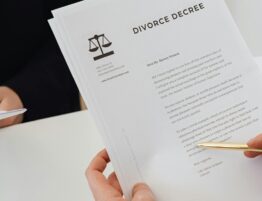Facing a wrongful conviction can be a life-altering experience, leading to loss of freedom, reputation, and significant personal hardships.
At The Law Office of Daniel Hutto, we specialize in criminal defense and are committed to providing the legal expertise needed to address and rectify wrongful convictions.
Here’s what this article will cover:
- What Is a Wrongful Conviction?
- Examples of Wrongful Convictions
- Why Are People Wrongfully Convicted?
- Defenses Against Wrongful Conviction Cases
- What Should I Do if I Am Wrongfully Convicted in Phoenix?
- Key Qualities to Look for in a Criminal Defense Attorney
According to the National Registry of Exonerations, more than 2,800 wrongful convictions have been overturned in the United States since 1989, highlighting the critical need for effective legal representation.
How an Arizona Criminal Defense Attorney Can Help
Our Phoenix Criminal Defense Attorneys are Here to Help!
What Is a Wrongful Conviction?
A wrongful conviction occurs when an individual is found guilty of a crime they did not commit.
These convictions can result from various factors, including witness misidentification, misconduct by law enforcement, or ineffective legal representation.
In Arizona, wrongful convictions are particularly concerning due to the severe penalties associated with many criminal offenses.
Under Arizona Revised Statutes §13-4231, individuals who believe they have been wrongfully convicted can seek post-conviction relief.
This legal provision allows for reviewing new evidence or any procedural errors that could have affected the trial’s outcome.
Examples of Wrongful Convictions
Several notable cases highlight the prevalence and impact of wrongful convictions.
These examples demonstrate the importance of rigorous legal defense and the potential for justice to prevail:
- Michael Morton Case: Wrongfully convicted in 1987 for the murder of his wife, Morton was exonerated in 2011 after DNA evidence pointed to another suspect. His case underscores the critical role of DNA testing in overturning wrongful convictions.
- Kirk Bloodsworth Case: The first American on death row to be exonerated through DNA evidence, Bloodsworth was wrongfully convicted of the rape and murder of a nine-year-old girl. His exoneration highlights the fallibility of eyewitness testimony.
- Debra Milke Case: Convicted in 1990 for conspiring to murder her son, Milke’s conviction was overturned in 2013 due to prosecutorial misconduct and the unreliability of key witness testimony.
These cases serve as reminders of the justice system’s fallibility and the importance of relentless advocacy for those wrongfully accused.
Why Are People Wrongfully Convicted?
Wrongful convictions can arise from multiple sources, often involving a combination of errors and systemic flaws.
Common causes include:
› Eyewitness Misidentification: Witnesses can unintentionally or intentionally misidentify suspects, leading to false convictions.
› Forensic Errors: Faulty or misinterpreted forensic evidence can result in wrongful convictions, particularly when forensic methods are not scientifically validated.
› False Confessions: Coercive interrogation techniques can lead to false confessions, especially among vulnerable individuals.
› Inadequate Legal Defense: Ineffective assistance of counsel, where defense attorneys fail to provide competent representation, can contribute to wrongful convictions.
› Prosecutorial and Police Misconduct: Misconduct, such as withholding exculpatory or fabricating evidence, can lead to wrongful convictions.
Addressing these issues requires a multifaceted approach, including legal reforms, improved forensic practices, and stringent oversight of law enforcement agencies.
Defenses Against Wrongful Conviction Cases
Defending against a wrongful conviction requires a strategic and thorough approach.
Key defense strategies include:
- New Evidence Presentation: Introducing new evidence, such as DNA tests or witness recantations, can be pivotal in overturning wrongful convictions.
- Challenging Forensic Evidence: Scrutinizing and disputing the validity of forensic evidence used in the original trial.
- Highlighting Procedural Errors: Identifying and presenting procedural errors or violations of constitutional rights that occurred during the trial.
- Effective Legal Representation: Ensuring that the individual has competent legal counsel to navigate the complexities of post-conviction relief.
At The Law Office of Daniel Hutto, we employ these strategies to vigorously defend our clients and seek justice for those wrongfully convicted.
What Should I Do if I Am Wrongfully Convicted in Phoenix?
If you believe you have been wrongfully convicted in Phoenix, it is crucial to act swiftly and methodically:
- Contact an Experienced Criminal Defense Attorney: Seek legal representation from an attorney experienced in handling wrongful conviction cases. At The Law Office of Daniel Hutto, we specialize in such cases and can provide the expertise needed to pursue justice.
- Preserve All Evidence: Safeguard any evidence supporting your innocence claim. This includes physical evidence, documents, and potential witness statements.
- File for Post-Conviction Relief: Work with your attorney to file a petition for post-conviction relief.
- Maintain Confidentiality: Avoid discussing your case publicly or with individuals not directly involved in your legal defense.
By taking these steps, you can build a strong foundation for challenging a wrongful conviction and seeking the justice you deserve.
Wrongful Arrests and Convictions in Criminal Cases: Misdemeanor and Felony Levels
Unlawful arrests and convictions can occur at both misdemeanor and felony levels in the criminal justice system.
The implications, however, can vary significantly depending on the severity of the criminal charge.
Wrongful Arrests
A wrongful arrest happens when law enforcement officers detain an individual without proper legal justification.
This can occur due to mistaken identity, false accusations, or a lack of probable cause. In a criminal case, such errors can lead to significant personal and financial harm.
Under Arizona law, individuals who believe they have been wrongfully arrested can file a civil lawsuit for false arrest or imprisonment.
They may seek damages for the emotional distress and any financial losses incurred due to the arrest.
Wrongful Misdemeanor Convictions
While wrongful misdemeanor convictions generally carry less severe penalties than felonies, they can still have substantial consequences, including fines, probation, and a criminal record.
For example, being wrongfully convicted of a DUI under Arizona Revised Statutes §28-1381 can result in significant legal and personal repercussions. The same strategies used in felony criminal cases, such as challenging the evidence and presenting new facts, apply to defending against wrongful misdemeanor convictions.
Wrongful Felony Convictions
Wrongful felony convictions are particularly grave due to their long-lasting impacts, such as lengthy prison sentences, loss of civil rights, and social stigma.
Cases involving serious felonies, such as those under A.R.S. §13-1105 (First-Degree Murder), require meticulous legal work to overturn.
This can include DNA testing, re-examining forensic evidence, and exposing law enforcement or prosecutor misconduct.
By understanding the potential for wrongful arrests and convictions at both misdemeanor and felony levels, individuals can better navigate the complexities of the criminal justice system and seek the justice they deserve.
Key Qualities to Look for in a Criminal Defense Attorney
Choosing the right criminal defense attorney can significantly impact the outcome of your case.
Here are key qualities to consider:
- Experience with Wrongful Convictions: An attorney with a proven track record in wrongful conviction cases will have the necessary expertise and insight.
- Strong Trial and Negotiation Skills: Look for an attorney who excels both in the courtroom and in negotiating settlements.
- Thorough Understanding of Arizona Law: Ensure your attorney is well-versed in the Arizona Criminal Code and relevant statutes.
- Commitment to Client Advocacy: Your attorney should be dedicated to fighting for your rights and committed to pursuing justice on your behalf.
At The Law Office of Daniel Hutto, our Phoenix criminal defense attorneys pride ourselves on embodying these qualities and providing our clients with top-tier legal representation.
Get Help From an Arizona Criminal Defense Attorney

Falsely charged with a crime represents a grave injustice, but with the right legal representation, there is hope for rectifying these errors.
At The Law Office of Daniel Hutto, we fight for the wrongfully convicted and uphold their rights.
Contact us today at 602 536-7878 to schedule your free consultation.














